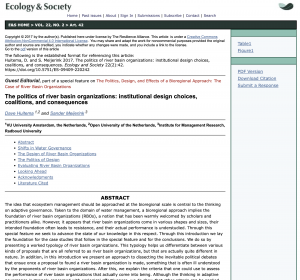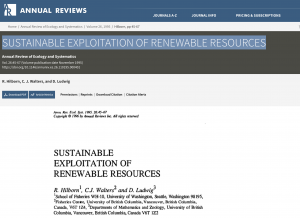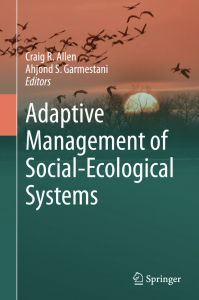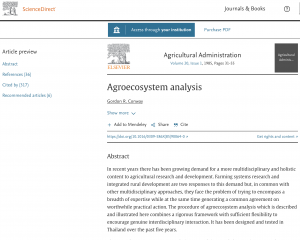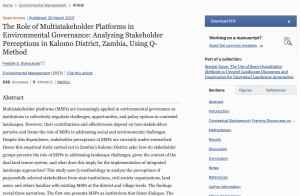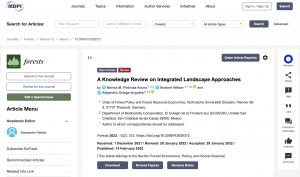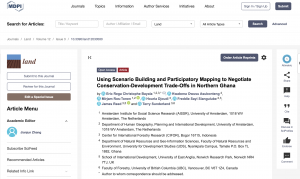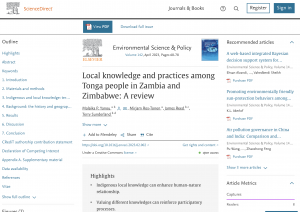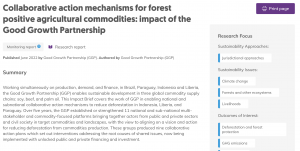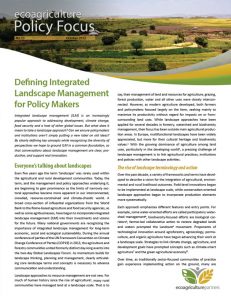Category: Publications and papers
The politics of river basin organizations: institutional design choices, coalitions, and consequences
This paper looks at all aspects of river basin organisations (RBOs), including the inevitable political debates during their formation, and examines lessons learned to make RBOs more effective in the future.
Sustainable Exploitation of Renewable Resources
This paper examines the huge number of variables involved in achieving the maximum potential yield in a sustainable manner, and looks at why it is often small-scale community or privately owned institutions that are the most successful at doing it.
Adaptive Management of Social-Ecological Systems
This book examines all aspects of adaptive management including the history, theory, and its use in practice that allows stakeholders to modify plans to move forward.
Agroecosystem analysis
A systems analysis approach looking at agrosystems and how to ensure true multidisciplinary ways of working together. It concludes with questions for further research.
The Role of Multistakeholder Platforms in Environmental Governance: Analyzing Stakeholder Perceptions in Kalomo District, Zambia, Using Q-Method
This empirical study in Zambia's Kalomo District examines stakeholder perceptions of multistakeholder platforms (MSPs) in addressing landscape challenges within a dual land tenure system. Using Q-methodology, the study identifies three narratives: MSPs as fostering dialogue, emphasizing the role of government and private sector, or addressing power imbalances. While the narratives differ, there is consensus on the potential of MSPs to harmonise policies and promote dialogue to tackle landscape challenges.
A Knowledge Review on Integrated Landscape Approaches
Holistic and multi-transdisciplinary approaches, where multiple goals are achieved in order to improve resilience in societies and ecosystems in the short, medium, and long term, are ideal, even utopian. Hence, science has come together with practical experiences that highlight the importance of working at a ‘landscape’ level.
Using Scenario Building and Participatory Mapping to Negotiate Conservation-Development Trade-Offs in Northern Ghana
In multifunctional landscapes, expanding economic activities jeopardise the integrity of biodiverse ecosystems, generating conservation-development trade-offs that require multi-stakeholder dialogue and tools to negotiate conflicting objectives. Despite the rich literature on participatory mapping and other tools to reveal different stakeholder perspectives, there is limited evidence on the application of such tools in landscape-scale negotiations.
Local knowledge and practices among Tonga people in Zambia and Zimbabwe: A review
There is increasing recognition of the role of Indigenous and local knowledge systems in sustainable land use and conservation practices. However, the evidence base remains fragmented, while local knowledge remains marginalised in many national biodiversity strategies and development plans. This applies to the Tonga people of Zambia and Zimbabwe. Here, we synthesise existing evidence of Tonga knowledge and practices to explore their potential contribution to the implementation of integrated landscape approaches that aim to incorporate multiple stakeholders’ objectives in landscape-scale management.
Collaborative action mechanisms for forest positive agricultural commodities: impact of the Good Growth Partnership
Working simultaneously on production, demand, and finance, in Brazil, Paraguay, Indonesia and Liberia, the Good Growth Partnership (GGP) enables sustainable development in three global commodity supply chains: soy, beef, and palm oil. This Impact Brief covers the work of GGP in enabling national and subnational collaborative action mechanisms to reduce deforestation in Indonesia, Liberia, and Paraguay.
Defining Integrated Landscape Management for Policy Makers
This brief lays out and explains the five critical elements of integrated landscape management, particularly where agriculture is an important land use, and illustrates the importance and background of the approach.


